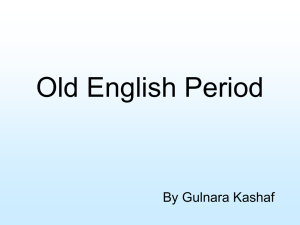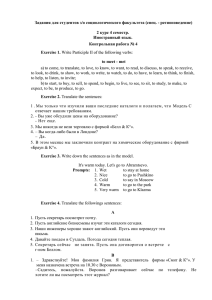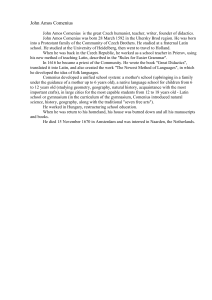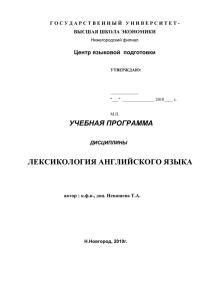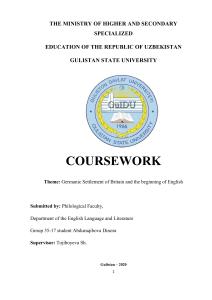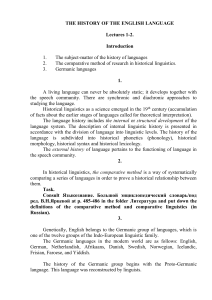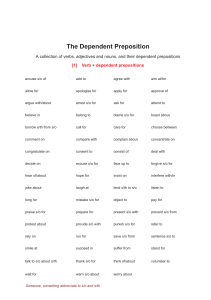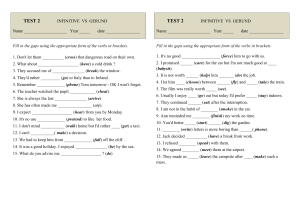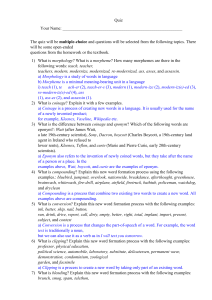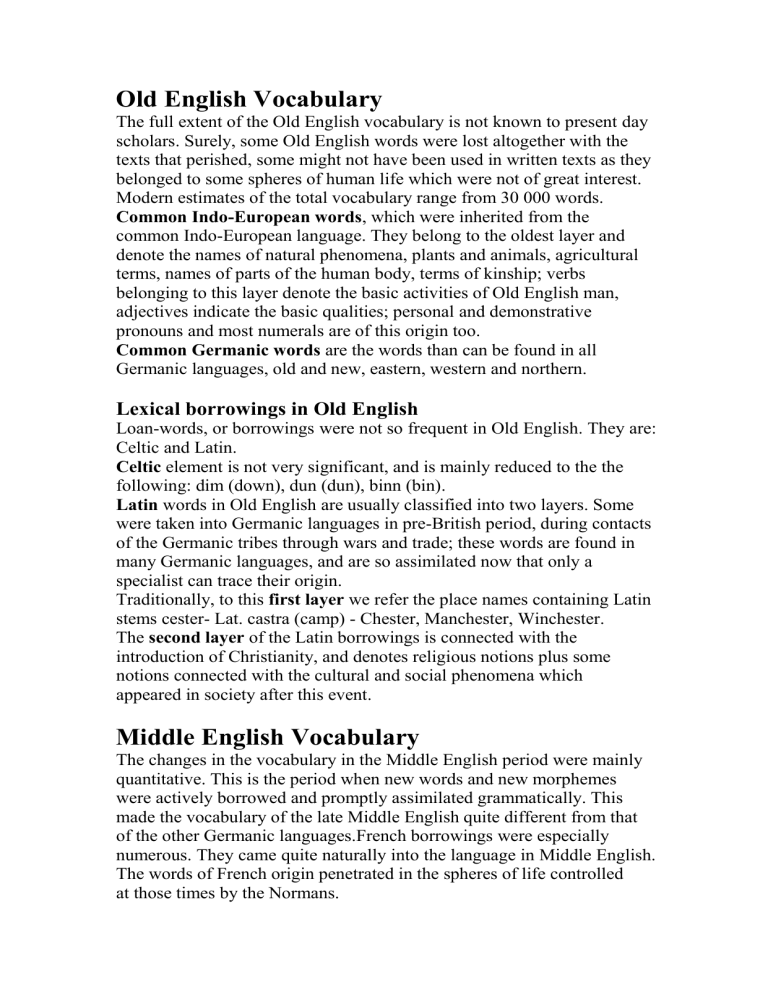
Old English Vocabulary The full extent of the Old English vocabulary is not known to present day scholars. Surely, some Old English words were lost altogether with the texts that perished, some might not have been used in written texts as they belonged to some spheres of human life which were not of great interest. Modern estimates of the total vocabulary range from 30 000 words. Common Indo-European words, which were inherited from the common Indo-European language. They belong to the oldest layer and denote the names of natural phenomena, plants and animals, agricultural terms, names of parts of the human body, terms of kinship; verbs belonging to this layer denote the basic activities of Old English man, adjectives indicate the basic qualities; personal and demonstrative pronouns and most numerals are of this origin too. Common Germanic words are the words than can be found in all Germanic languages, old and new, eastern, western and northern. Lexical borrowings in Old English Loan-words, or borrowings were not so frequent in Old English. They are: Celtic and Latin. Celtic element is not very significant, and is mainly reduced to the the following: dim (down), dun (dun), binn (bin). Latin words in Old English are usually classified into two layers. Some were taken into Germanic languages in pre-British period, during contacts of the Germanic tribes through wars and trade; these words are found in many Germanic languages, and are so assimilated now that only a specialist can trace their origin. Traditionally, to this first layer we refer the place names containing Latin stems cester- Lat. castra (camp) - Chester, Manchester, Winchester. The second layer of the Latin borrowings is connected with the introduction of Christianity, and denotes religious notions plus some notions connected with the cultural and social phenomena which appeared in society after this event. Middle English Vocabulary The changes in the vocabulary in the Middle English period were mainly quantitative. This is the period when new words and new morphemes were actively borrowed and promptly assimilated grammatically. This made the vocabulary of the late Middle English quite different from that of the other Germanic languages.French borrowings were especially numerous. They came quite naturally into the language in Middle English. The words of French origin penetrated in the spheres of life controlled at those times by the Normans. They were numerous in the sphere of government, court, jurisdiction: aquiten (acquit) 1200-50; attourne (attorney) 1250-1300; baillif (bailiff) 1250-1300; baroun (baron) 1200-50; condempnen (condemn) 1350-1400. Military terminology is another segment of the vocabulary where French element is dominant: armee (army) 1350-1400; bcttaille (battle) 1250-1300; capitain (captain) 1325-75; conqueren (conquer) 1200-50; generate (general) 1250-1300. Religious terminology, as is known, is almost fully taken in Old English from Latin. In Middle English the already existing words were supplemented by French which was quite organic. Some of the words taken in Middle English were later "corrected" and some Latin sounds that were lost in French were introduced: baptize (baptize) 1250-1300; bull/bulla (bull) 1250-1300; clergie (clergy) 1175-1225; confessioun (confession) 1350-1400; converten (convert) 1250-1300. Words belonging to the sphere of building or construction occupy a special place among the borrowings from French. So, some of the words that had no lofty or bookish shade in French came into the English language as elements characteristic of higher life: barre (bar) 1175-1225; chambre (chamber) 1175-1225; chapele (chapel) 1175-1225; columne (column) 1400-50; matter (manor) 1250-1300. Town crafts were usually named by words of French origin: apothecary (apothecary) 1325-75; harbour (barber) 1275-1325; bocher (butcher) 1250-1300; carpenter (carpemter) 1275-1325; joinour (joiner) 13501400. Vocabulary pertaining to arts was rich in words borrowed from French: art (art)1175-1225; cisel (chisel) 1325-75; colour (colour)l 250-1300; daunce (dance) 1250-1300; floute (flute) 1350-1400. School at that period was frenchified, and together with Latin words we may observe a lot of words the origin of which is French: lessoun (lesson) 1175-1225; penne (pen) 1250-1300; pensil (pencil cf. Ukr. пензель) 1225-75; pupille (pupil) 1350-1400. Leisures and pleasures - that is another semantic sphere where the borrowed element is frequent: carole (carol) 1250-1300; charme (charm) 1250-1300; comfort (comforf)1175-1225; dauncen (dance) 1250-1300; feste (feast) 1150-1200. The names of domestic animals remain of native origin. Borrowings in the Early New English Latin borrowings were especially numerous. Some preserved Latin grammatical morphemes which are no longer felt as such, the word belongs to any part of speech irrespective of the part of speech suffix. Here are some examples of the borrowings of the period: Nouns: amplitude 1540-50; applause 1590-1600; class 1590-1600; consultation 1540-50; demolition 1540-50. As far as verbs are concerned, some distinctive morphemes are to be mentioned here: accommodate 1515-25; accumulate 1520-30; agitate 1580-90; appreciate 1645-55; calculate 1560-70. Many verbs borrowed from Latin have the suffix -cf: inject 1590-1600; inspect 1615-25; neglect 1520-30; predict 1540-50; protect 1520-30. Not so numerous are those that have the suffix -ute : compute 1580-90; constitute 1400-50; contribute 1520-30; dilute 1545-55; distribute 140050. Some verbs were taken from the stem of the present tense of the verbs of the 3 rd conjugation: append 1640-50; applaud 1530-40; collide 1615-25; deduce 1520-30; explode 1530-40. Adjectives that go back to Latin words may be derived from adjectives and participles. Those that have the suffixes -ant/ent retain the suffix of the Latin present participle, but they are fully adjectivized in English: deficient 1575-85; exponent 1575-85; important 1580-90; indignant 1580-90; latent 1610-20. The Latin suffix -atus, that of the past participle is preserved in the form ate in many adjectives: accurate 1605-15; degenerate 1485-95; elaborate 1575-85; immediate 1525-35; importunate 1520-30. So is the suffix of the comparative degree -ior: anterior 1535-45; junior 1520-30; excelsior 1770-80; posterior 1525-35; exterior 1525-35. Simple borrowing of adjectives as they were without much changing is marked by Latin suffixes: -al: aerial 1595-1605; global 1670-80; controversial 1575-85; legal 1490-1500. -ivus —> -ive: abusive 1575-85; adversative 1525-35; cooperative 15951605; corrective 1525-35. -aris —> -ar: auricular 1535-45; lunar 1585-95; jimi/ar 1605-15; stellar 1650-60; triangular 1535-45. -icus—> -ic: analytic 1580-90; critic 1575-85; domestic 1515-25; ironic 1620-30; magnetic 1625-35. -idus —> -id: lucid 1575-85; gelid 1600-10; frigid 1590-1600; livid 1615-25; morbid 1650-60. -tus —> -ust: robust 1540-50. -usus —> -ous: assiduous 1530-40; atrocious 1660-70; continuous 163545; decorous 1655-65; dubious 1540-50. French borrowings in Early New English are somewhat different from those taken in Middle English. They are no longer superimposed by a winning nation but are taken freely, and semantic grouping is more fuzzy - here we may find words from the military sphere, words connected with leisure, pastime and games, culinary terms and so on: apricot 1545-55; attack 1590-1600; avenue 1590-1600; ballet 1660-70; ballot 1540-50. Borrowing Italian,words at this period is explained by great influence of Italy in certain spheres of life. Italian architecture, music, banking and military affairs exelled in those times. The borrowings of this period are: arsenal 1500-10; artichoke 1525-35; bankrupt 1525-35; baritone 160010; canto 1580-90. Spanish borrowings of this period are rather numerous and can be subdivided into two groups - borrowings of the native Spanish words such as renegade 1575-85; guitar 1615-25; mosquito 1575-85; cigar 1625-35; sombrero 1590-1600 and those that were taken into Spanish from various American Indian languages. Portuguese borrowings of the period are not so numerous and reduced to a number of words denoting some material things like animals and some fruit: marmalade 1515-25; zebra 1590-1600; flamingo 1555-65; jaguar 1595-1605; copra 1575-85. The Dutch element comes into the English language in a considerable number of words, reflecting the specificity of their commercial ties. The Netherlands of the period was well-known for its school of painting, its crafts and a well-developed fleet. Hence the Dutch borrowings of the Early New English period are: wagon 1505-15; frolic 1530-40; dabble 1550-60; yacht 1550-60; freebooter 1560-70. Russian borrowings of the Early New English period are not so numerous - muzhik 1560-70, telega 1550-60, boyar 1585-95, beluga 1585- 95, kumiss 1590-1600 and, like the above mentioned borrowings from Polish or Ukrainian are restricted to naming specifically Russian phenomena. Borrowings from Arabic were of mixed nature - some became part and parcel of the English vocabulary and bear no local colouring: algebra 1535-45, alcohol 1535-45, carat 1545-55, henna 1590-600, sofa 1615-25. The majority of the borrowing from Hebrew came in the earlier periods through Latin (Satan bef. 900, amen bef. 1000 cherub bef. 900, manna bef. 900 rabbi 1250-1300), one of the Early New English is hallelujah 152535. Some words were coined from the morphemes borrowed from classical languages, though in such combinations they never existed either in Latin Of in Greek. Later they were borrowed into many languages and are usually referred to as international words: biography 1675-85, geodesy 1560-70. geology 1680-90. zoography 158595, zoology 1660-70, orthoepy 1660-70, psychology 1675-85, stereometry 1560-70, telescope 1610-20, atmosphere 1630-40. This pattern proved productive, and we can see with the development of science and technology later coinages: bacteriology 1880-85. dactylogram [910-15, photography 1839, telegraph 1792, television 1905-10, telephone 1825-35, phonograph 1825- 35,ecology 1870-75, ecosphere 1950-55, ecosystem 1930-35, perinatology 1975-80 etc. Sometimes there exist their counterparts made by suffixation from native roots as well, or qualitative meanings are rendered by nouns in premodification to other nouns, adjectives of Latin origin being more bookish and official: son-filial 1350-1400; town - urban 1610-20; tree arboreal 1660-70; tooth - dental 1585-95; eye - ocular 1565-75. Derivatives from Latin stems in the other parts of speech are also common: three - tripod 1595-1605; triangle 1350-1400; triceps 1570-80 eight - octagon 1650-60; octopus 1750-60; octuple 1595-1605.
